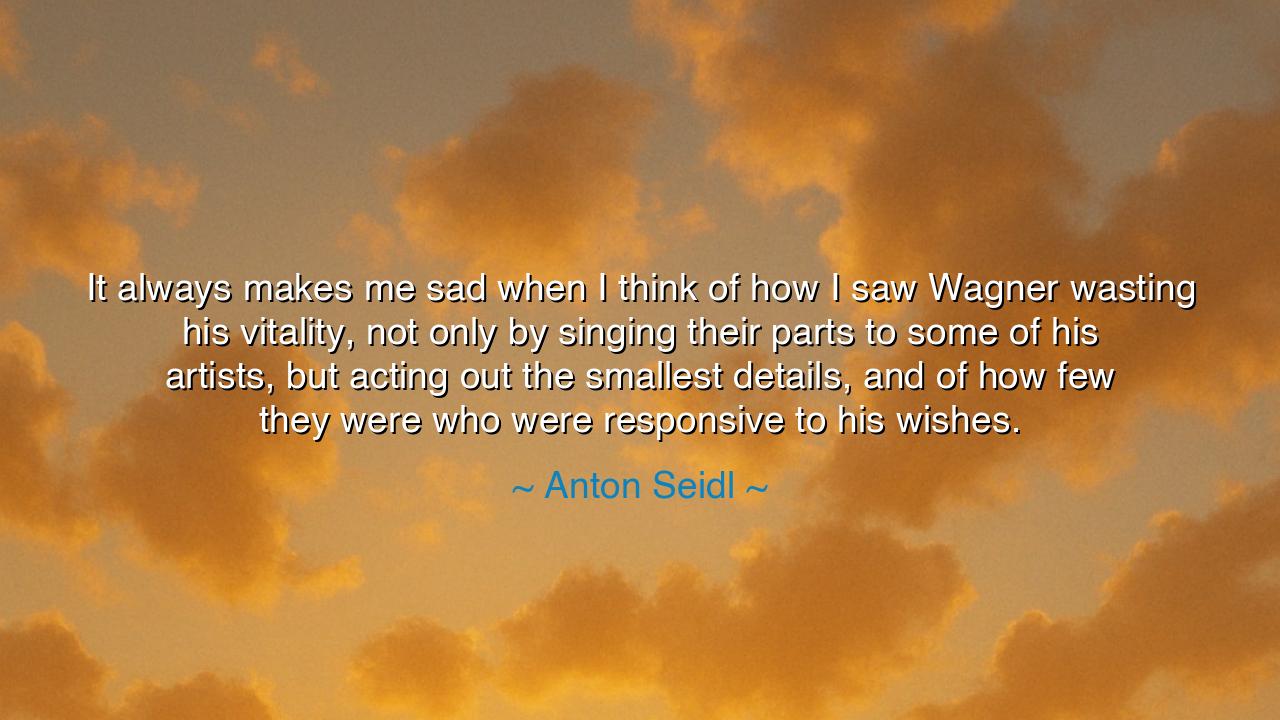
It always makes me sad when I think of how I saw Wagner wasting
It always makes me sad when I think of how I saw Wagner wasting his vitality, not only by singing their parts to some of his artists, but acting out the smallest details, and of how few they were who were responsive to his wishes.






Hear the words of Anton Seidl, a disciple and conductor of Richard Wagner, who spoke with sorrowful memory: “It always makes me sad when I think of how I saw Wagner wasting his vitality, not only by singing their parts to some of his artists, but acting out the smallest details, and of how few they were who were responsive to his wishes.” These words, though spoken of a single man, carry within them the timeless tragedy of genius unheeded, of passion spent upon hearts too dull or unwilling to receive it.
The image painted is vivid: Wagner, master of music and drama, not content merely to instruct his singers with words, but pouring his very life into demonstration—singing their lines, acting their gestures, embodying with his body and spirit the grandeur of his art. This is the hallmark of true genius: it does not remain aloof, but descends into the work, giving everything, even to exhaustion. Yet Seidl’s sadness is born from the futility of such giving, for the artists often stood unresponsive, unable or unwilling to rise to the vision being revealed before them.
This is not merely Wagner’s story, but the story of many creators throughout history. Consider Michelangelo, lying on his back for years painting the Sistine Chapel, pouring his health, his eyes, his strength into the ceiling that would outlast him. He complained of the toll upon his body, yet persevered, knowing few around him truly understood the immensity of his vision. Like Wagner, he wasted vitality in the eyes of the world, yet in truth he transmuted that vitality into immortal beauty. The sorrow lies not in the giving, but in the loneliness of being uncomprehended.
So too with Vincent van Gogh, whose canvases blazed with color and fire, painted at the cost of his health, his mind, his very peace. He gave everything—his vitality, his nights, his sanity—to capture visions the world could not yet see. And like Wagner, he too was surrounded by the unresponsive, the blind, those who could not or would not recognize the gift being offered. The sadness that Seidl names is not simply pity for Wagner’s exhaustion, but pity for a world too slow to embrace the greatness offered to it.
Yet within this sadness is also a noble lesson. For Seidl’s words remind us that genius often stands alone, compelled to give beyond measure even when response is small. The true creator cannot help but act out the details, cannot help but burn his vitality in service to the vision within. It is not wasted, though it may appear so, for every drop of that vitality becomes the seed of works that endure beyond the life of their maker. Wagner’s operas still thunder across the centuries, proof that his sacrifice was not in vain.
The teaching is plain: if you are a creator, an innovator, a leader of vision, do not despair if the world seems unresponsive. Do not measure the worth of your labor by the immediate applause or comprehension of those around you. Pour yourself into your work, as Wagner did, knowing that though some may not respond, others yet unborn may hear, see, and understand. What feels like wasted vitality today may be remembered as immortal brilliance tomorrow.
Practical is this counsel: guard your strength, yes, but do not withhold your passion. Give fully, but give with wisdom. Seek those who can respond, and do not be disheartened by those who cannot. And when you see another pouring themselves out in dedication, do not stand silent—respond, support, and honor their labor. For the sadness Seidl described was not only in Wagner’s sacrifice, but in the fewness of those who responded. To respond is itself an act of greatness, for it gives meaning to the labor of the visionary.
So remember Seidl’s words: “It always makes me sad when I think of Wagner wasting his vitality…” Let them not only be a lament, but a call to awaken. Honor the passion of those who strive, respond to the vision of those who give, and if you are one who carries a fire within, do not fear the loneliness of your path. For vitality given in service of beauty, truth, or greatness is never wasted—it is transformed into legacy, into music, into light that shines long after the flame has burned itself out.






AAdministratorAdministrator
Welcome, honored guests. Please leave a comment, we will respond soon